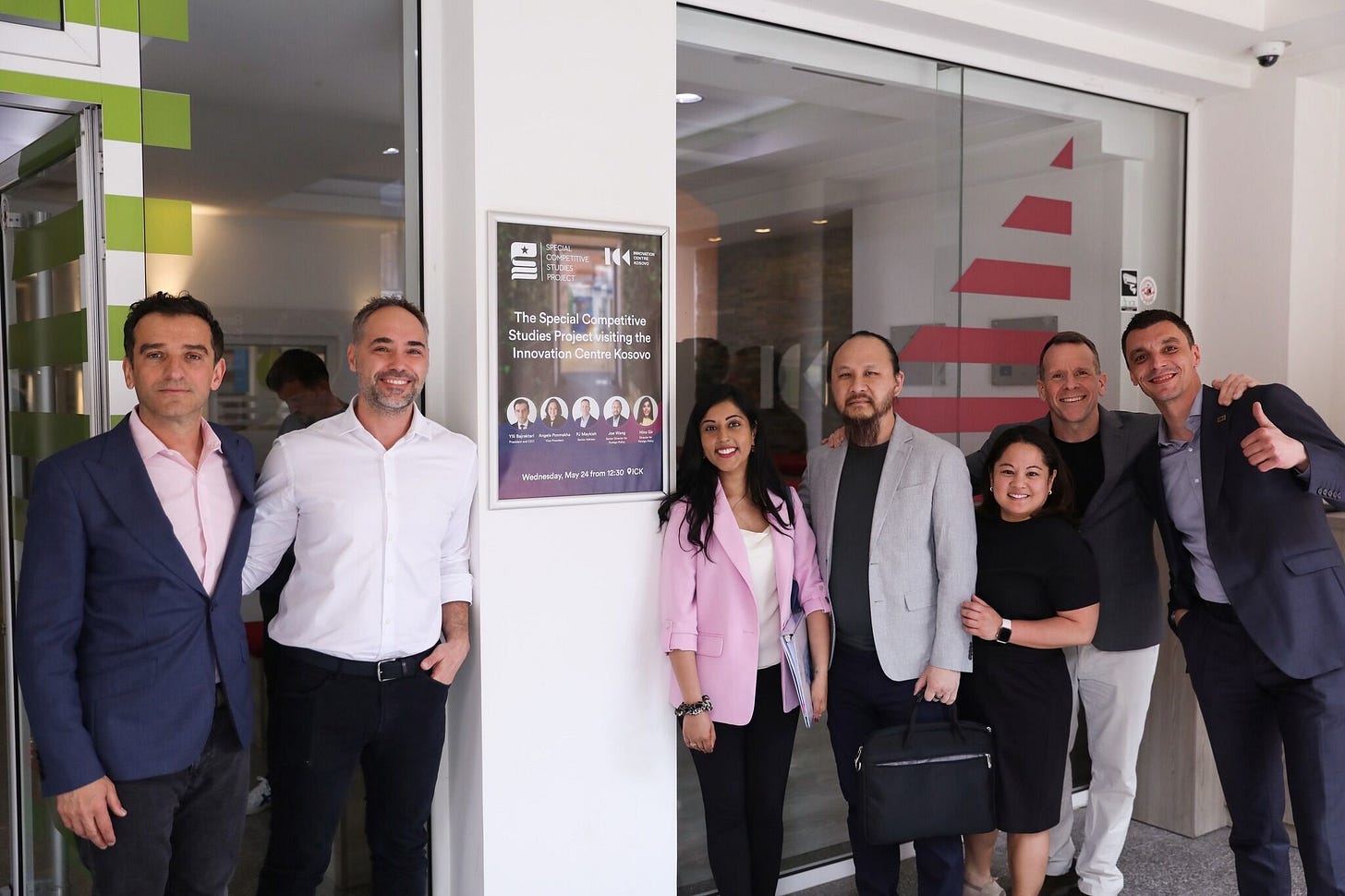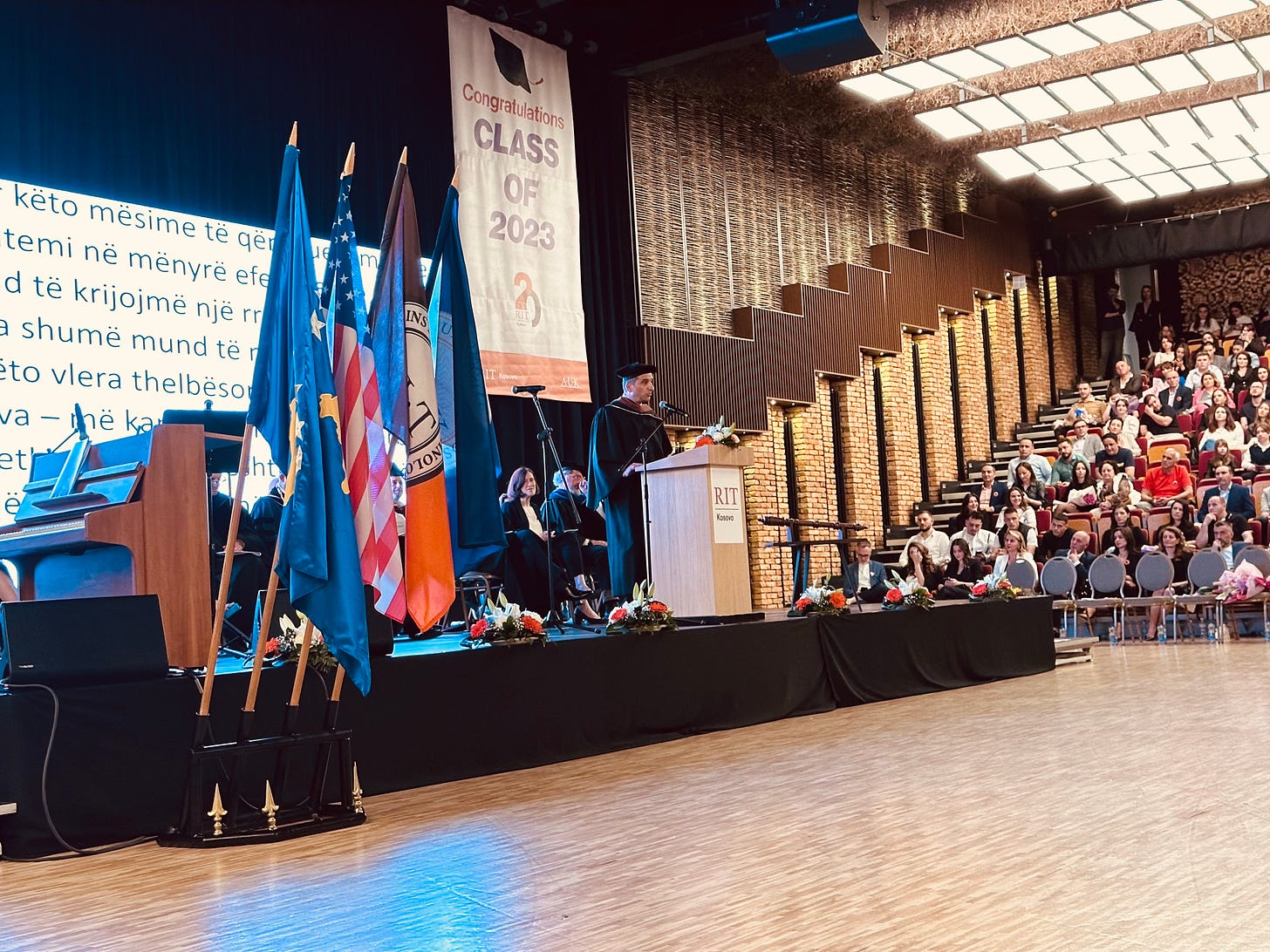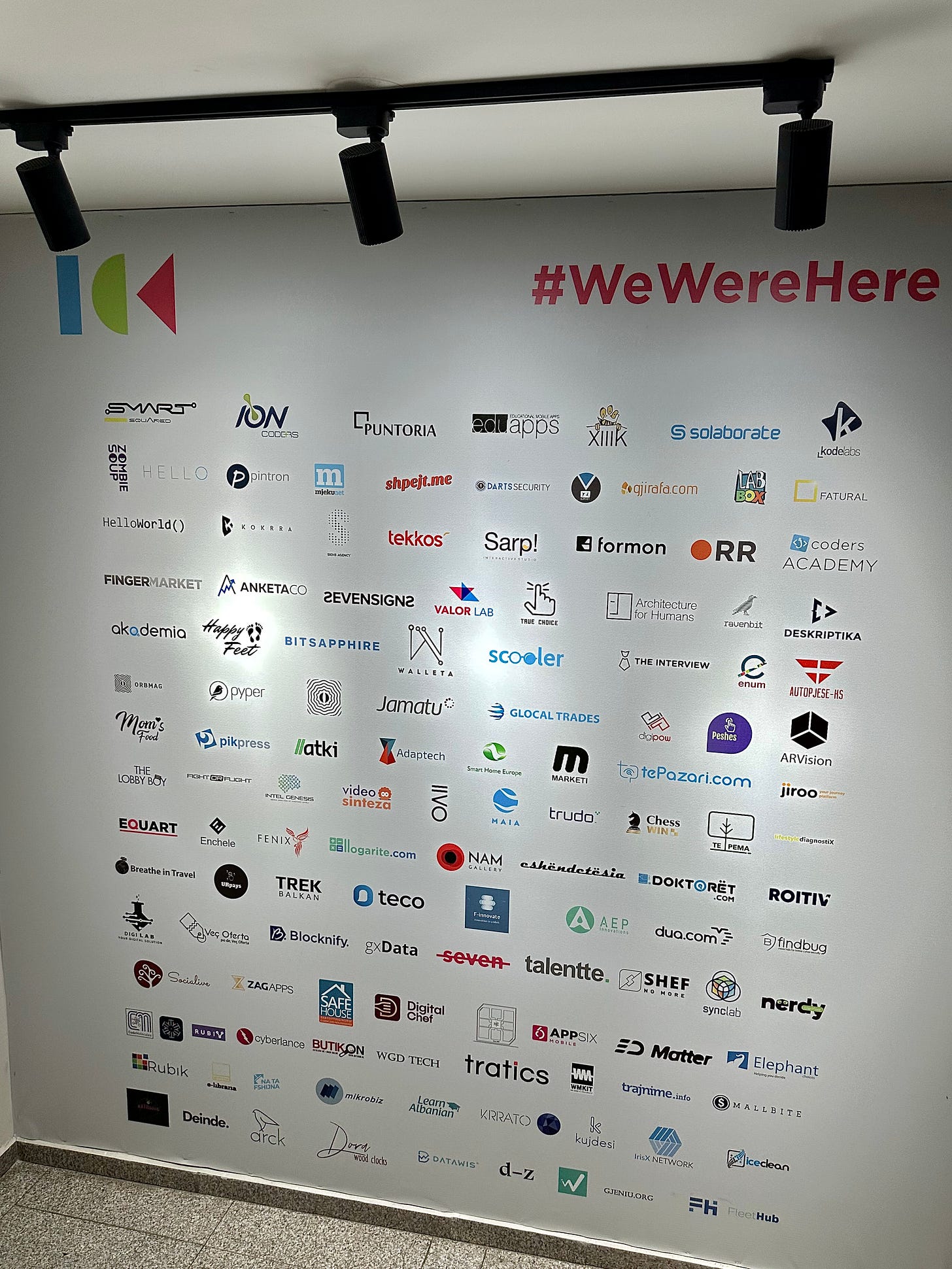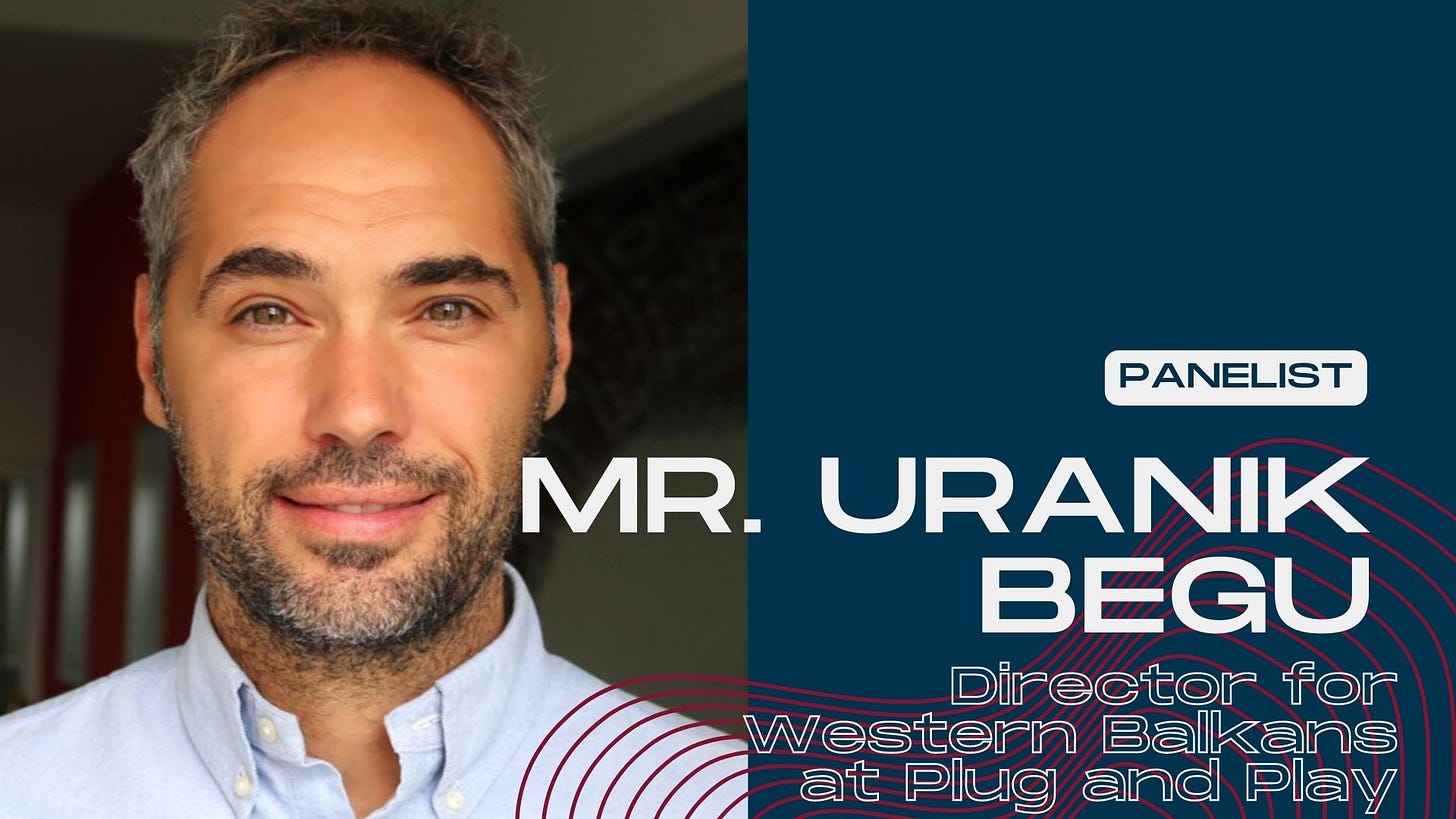The Promise of Tech in a Challenging Region - How America Can Build on Two Decades of Success in Kosovo
Hello, I’m Ylli Bajraktari, CEO of the Special Competitive Studies Project. In May, I had the opportunity to travel to Kosovo’s capital Prishtina with the SCSP team. It was an emotional trip for me as I was walking the streets where I grew up with Joe, Hina, PJ, and Angela. And there is no country in the world where it feels better to say you are from the United States than Kosovo given the positive role America played throughout the years there in supporting freedom. In this edition of 2-2-2, SCSP’s Hina Gir and Joe Wang reflect on some of the key takeaways from the trip there beyond the current headlines.
But before you read the impressions from the trip to Kosovo, let me share with you some SCSP news…
Last week, we announced our third annual Global Emerging Technology Summit. We hope that you will join us. Please RSVP since the space is limited.
Also, right after Labor Day, SCSP will release six memos on Generative AI. Each memo will cover a specific area for the need to adopt generative AI for economic, societal, and national security purposes. Stay tuned for “Six days of AI in September.”
Setting the Scene
When arriving in either America or Kosova, your journey starts at customs with a striking similarity. After landing at Prishtina’s “Adem Jashari” airport, one is customarily greeted with a hearty “Welcome to Kosova!” - like the “welcome home!” one hears returning to Dulles Airport after a long trip. No surprise there since the Kosovo Police was trained by the Department of Justice Program ICITAP (International Criminal Investigative Training Assistance Program). During our week-long trip, we had a series of engagements with Kosovar and U.S. officials, academic and student leaders, and private and non-profit innovators and experts. Our visit occurred just before the recent escalations in Northern Mitrovica.
Last week, NATO completed its major Summit in Vilnius but next year, 2024, will be the 75th anniversary of the signing of the North Atlantic Treaty and the 25th anniversary of NATO’s intervention in Kosovo. The tensions in the Western Balkans are a reminder of the importance of U.S. leadership, statecraft, and military power that supports the vision of a Europe that is whole, free, and at peace - a bipartisan policy that stems over decades. While much attention is rightly paid to the ongoing war in Ukraine and Ukraine’s future with NATO, the United States and Europe should not lose sight of this critical region that sparked the First World War and led to one of the first major post-Cold War crises on the European continent. The United States has been crucial to stability in the region ever since, particularly in supporting the creation of the world's second youngest nation and Europe’s youngest democracy – the Republic of Kosovo – in 2008. A visit to Kosovo is all that is needed to see a contemporary vibrant success story of America’s foreign policy over the years.
As the United States enters a new era of global competition vis-à-vis the People’s Republic of China (PRC) and the authoritarian model of governance it represents, such success stories matter as concrete demonstrations of what American leadership and power can achieve. Supporting Kosovo’s success means supporting America’s success. Even as the United States works with our European Allies to bring about the normalization of relations between Kosovo and Serbia, we believe doubling down on tech cooperation with Kosovo, given its pro-American and pro-tech characteristics, offers a clear path to strengthen its sovereignty, security, and prosperity. This can serve as a model for a new tech-focused approach to foreign assistance that the United States will need to compete against the PRC’s tech efforts around the world to include Kosovo's northern neighbor Serbia. For Kosovo, the government and the people there must not forget the importance of its relationship with the United States – the historical role that it has played over the past two decades, beginning with NATO’s intervention in 1999 to cease the humanitarian crisis and then shepherding Kosovo to independence. The opportunity before both nations now lies in prioritizing the future and the possibilities that artificial intelligence and other emerging technologies can unlock for our societies.
Discussion of the global technology competition often focuses on the great technology powers. Headlines are apt to center on new innovation in individual tech powerhouses, like the ChatGPT explosion in the United States, or instances of tech leaders coming together, such as the U.S.-Japan-Netherlands export semiconductor control success. Yet, untold technology competition stories are playing out on the ground in countries across the globe. Much of the international competition will be decided in these tech battleground nations based on the talent and resources they can bring to market. If engaged at the right time with the right partnerships, these countries can expand the ranks of nations working toward a tech-enabled democratic future. This is the story of just one of those nations — Kosovo.
What we found during our visit to Kosovo was a foundation for collaboration grounded in shared values, tech-savvy human talent, and a government that favors innovation. These commonalities were unsurprising, given our shared history and U.S. support for Kosovo’s democratic institutions and stability. As USAID Administrator Samantha Power’s May 2023 visit illustrates, Kosovo remains a priority and place of engagement for senior American leaders.
Nor are these ties limited to government-to-government engagement. The U.S. private sector, civil society, and academia have developed a robust presence that has inculcated shared beliefs in innovation, entrepreneurship, and the power of technology. Two such examples include the Rochester Institute of Technology – Kosovo (RIT-K), and the Innovation Centre Kosovo (ICK), a tech incubator in Pristina.
RIT-K
Formerly the American University of Kosovo (AUK), RIT-K highlights its connection to the United States. It touts offering an “American degree” to both undergraduate and graduate students and is noteworthy in being the first educational institution in Kosovo to offer an American educational experience. While the “T” in RIT-K stands for “Technology,” the university stands out as training the next generation of Kosovar public servants, young students inspired by the role of government in maintaining peace and advancing democratic values. Likewise, a generation with a deep appreciation for the role of the military as a stabilizing force is following in the footsteps of their elders to join the Kosovo Security Forces soon after graduation.
Simultaneously on the technology front, RIT-K has graduated 1500 students with a Bachelor of Science degree since its inception. This year marks RIT-K’s graduation of its first class with a Masters in Computing and Information Technology. RIT-K is forward-leaning in its efforts, using more American market analysis methods to match students to emerging employment sectors, including emerging technology areas.
ICK
The Innovation Centre Kosovo (ICK) is a one-of-its-kind incubator for Kosovar entrepreneurs. ICK currently provides training to community members and offers access to finance and infrastructure to start-ups. ICK serves as a hub, recognizing the importance of networks to tech entrepreneurship, and hosting events to enable network growth. Via this incubator, ICK boasts of creating 3,100 local jobs. ICK proudly hosts a wall showcasing the start-ups developed with ICK mentorship and support.

Additionally, ICK works to plant seeds for future tech entrepreneurs, complementing institutions like RIT-K. These efforts can start at a young age. For instance, ICK’s Junior Geeks, funded by the U.S. Department of State, offers a “platform for high school students to discuss, explore and learn about technology, entrepreneurship, science & innovation.” Such initiatives also play an important role in working to expand the space for women in Kosovo’s science and technology field.

Persistent Challenges
Despite these robust institutions and natural advantages, Kosovo remains a developing country that confronts real hurdles it must overcome to meet its full potential as an innovation hub. In particular, Kosovo needs the necessary domestic investments to support new economic opportunities and quality of life that will retain its talent pool to build up the country as a techno-economic hub.
Kosovo’s greatest strength, its domestic talent, is also a significant challenge. As with much of the developing world, Kosovo is subject to migration flows that stymie building up a robust human capital foundation. Kosovo competes with neighboring nations for talent and often loses the fight, particularly to Western Europe. Quality of life considerations, particularly around healthcare and educational opportunities, can push Kosovars to emigrate. Those deep ties to the United States also have inculcated a strong entrepreneurial spirit, which supports more freelance work that detaches talent — particularly tech talent — from remaining rooted in Kosovo.
Simultaneously, Kosovo remains a beneficiary of international assistance, reflecting a lack of deep capital pools necessary to cultivate a domestic tech ecosystem that produces new startups. Outward migration feeds this problem, undercutting the necessary tax base for the Kosovo government to invest in infrastructure, primary education, and healthcare. Such a challenge mirrors that faced in much of the developing world — a challenge only amplified as a growing number of international crises compel donors to refocus aid on extreme circumstances. Critical aid-dependent organizations, including ICK, face a precarious future as donors divert resources toward the war in Ukraine and other competing priorities.
The Strategic Path Forward around Tech
Getting over these hurdles requires a new bilateral, strategic emphasis on tech partnerships. As global technology competition becomes more pervasive, the United States and its democratic allies need to pivot toward tech-centric approaches to advance our interests with international development. Kosovo can be a model for what this tech-first approach to international development can look like. We recommend three elements to do so.
First, tech companies have a key role to play in international development. Development professionals have long recognized the importance of private sector engagement to catalyze on-the-ground advances. As the U.S. State Department has noted, the “private sector creates nine out of ten jobs in the developing world.” While connectivity still lags in much of the Global South, the digital economy continues to expand. Tech companies are seeking to enter new markets, and that requires regional hubs or offices that can provide new, good-paying jobs.
Countries like Kosovo offer a natural home. While Kosovo requires additional public infrastructure investment, the young nation has a solid foundation in digital infrastructure. Kosovo is a connected country. Over 93% of Kosovars have home internet access. This advantage is reinforced by a young, pro-American, English-speaking population and available, affordable work spaces.
Such conditions provide countries like Kosovo with opportunities to retain talent locally for quality jobs and thereby contribute to a virtuous cycle of employment, investment, and government revenue to support public works projects. That self-reinforcing dynamic not only benefits the hub country itself, but enables it to serve as a leader to elevate the entire region. And, in such cases, it is important that those actors — as Kosovo does — share those core democratic values that the United States and its allies hold dear.
Second, U.S. and other foreign government partners need to help connect tech firms with local actors and innovators in Kosovo. Such partnerships are key, as they can support continuing education and training to build out tech-capable workforces. But perhaps more importantly they help foster successive generations of local entrepreneurs and innovators with whom tech companies, particularly large platform or service providers, can collaborate.
Cooperation between U.S. and allied technology companies and private capital with these local incubators unlock tremendous new opportunities. For instance, as outlined, ICK already helps young Kosovar innovators make tremendous strides. With proper support, ICK could create an ICK AI Academy that could train not only Kosovars but also talent from neighboring countries, including visiting students and entrepreneurs from the Middle East due to historical and cultural ties.
Third, Pristina needs to embrace being a pro-innovation government that is eager to harness technology for public benefit. The developing world possesses fewer entrenched incumbents with legacy technology, creating room to deploy more cutting-edge innovations. For instance, this “leapfrog” dynamic is seen in the bypass of traditional landlines and the move straight to mobile phones, for many populations in Africa.
Such a pilot project is already underway in Kosovo. Currently, USAID is supporting the development of a platform similar to Ukraine’s Diia app to digitally connect citizens with government services. As Diia’s successes on the ground in Ukraine have demonstrated, digital governance tools can be powerful forces to increase governance capacity, streamline interactions for citizens, and even contribute to national defense. Thus, pro-innovation governments willing to be forward-looking, rather than trapped in old paradigms, are essential for welcoming new technologies and building supportive regulatory environments that allow innovators to unlock their potential.
Focusing on Targeted Opportunities to Build Tomorrow Today
The world has witnessed incredible development progress over the past thirty years. Between 1990 and 2015, the world exceeded the Millennium Development Goal of halving the number of individuals living in extreme poverty. However, more work remains, with too few resources to put toward these needs.
Kosovo remains a unique partnership for the United States, with all of the right conditions for strategic tech cooperation to take root. Neither side should forget the past, but we should build toward a future that strengthens the sovereignty, security, and prosperity of Kosovo to ensure the violence and conflict of the past do not repeat. Our two nations’ shared success there can then be a model for what American statecraft can achieve elsewhere around the world in a new era of strategic competition.
We are excited to announce that Uranik Beju, Director for Western Balkans at Plug and Play and Former Executive Director of Innovation Centre Kosovo will be joining us on a panel discussion.






